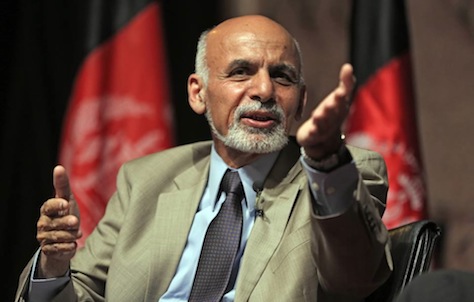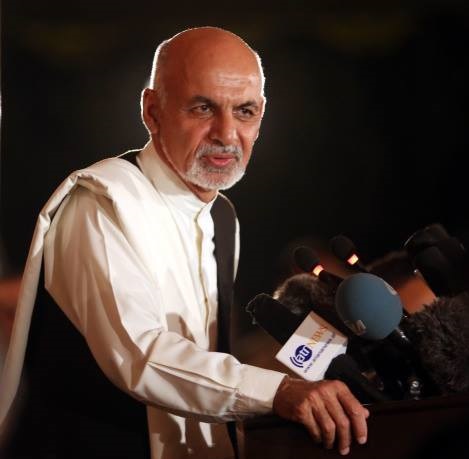
Afghanistan’s election officials have announced the results of the country’s June 14 presidential election, and the surprising winner seems to be former finance minister Ashraf Ghani Ahmadzai, who trailed widely after the results of the April 5 first round. 
The provisional result gives Ghani (pictured above) 56.44% of the vote, while rival Abdullah Abdullah won 43.56%.
It’s actually not so incredibly surprising in light of Abdullah’s denunciation over the past weeks of the vote-counting process, a sure sign that Abdullah realized he was in danger of losing the race.
On June 18, just four days after the election, Abdullah called for a suspension in the vote count by the Independent Election Commission, arguing that votes were counted in areas where voting hadn’t even taken place due to security problems.
* * * * *
RELATED: Afghanistan hopes for calm as
key presidential election approaches
RELATED: Why there’s reason for optimism
about the Afghan troop drawdown
* * * * *
Five days later, on June 23, Zia ul-Haq Amarkhail, the secretary-general of the IEC, resigned, an implicit admission that there’s at least some substantive basis to the fraud charges. The IEC delayed the original announcement of preliminary results, due on July 2, for five more days to investigate further the charges of voter fraud. As the BBC reports, votes are being re-checked at more than 7,000 polling stations, amounting to nearly one-third of all voting stations, and the commission will check nearly 4 million votes in an election that drew just 6.6 million voters in the first round:
Chief election commissioner Ahmad Yusuf Nuristani stressed that the results were not final and acknowledged that there had been “some mistakes in the overall process”.
“It is only initial results,” he told a news conference in Kabul. “There is a chance of change in the overall figure…. The announcement of preliminary results does not mean that the leading candidate is the winner.
“We announced preliminary results today and it is now the complaints commission’s duty to inspect this case.”
The next hurdle comes on July 22, when final results are due to be announced. In the next 15 days, supporters of both candidates are likely to amplify their calls of fraud and other recriminations in a country that’s still facing a Taliban insurgency that, even in the most optimistic scenario, will present a challenging obstacle to Afghanistan’s next government when most US forces leave at the end of this year. US officials largely believe that either Ghani or Abdullah would be acceptable successors to outgoing president Hamid Karzai, who has become increasingly disenchanted with the administration of US president Barack Obama. Both Ghani and Abdullah, for example, have pledged to enact a status-of-forces agreement with the United States that envisions a security presence beyond 2014.
So what’s going on in Afghanistan? After the first round of voting in the spring appeared largely to avoid the mistakes of the disastrous 2009 presidential election, the country now faces a protracted battle between Ghani’s chiefly Pashtun supporters and Abdullah’s chiefly Tajik supporters.
Continue reading Is Ghani’s Afghan preliminary electoral victory a fraud? →
![]()

